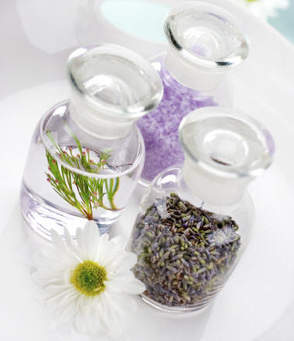Safety Precautions
Safety Precautions
Not all natural plants or plant products are beneficial to health. Deadly Nightshade can be poisonous and stinging nettles sting. The following essential oils should not be used under any circumstances.
| Bitter Almond | Rue |
| Boldo Leaf | Sassafras |
| Calamus | Savin |
| Yellow Camphor | Southernwood |
| Horseradish | Tansy |
| Jaborandi Leaf | Thuja |
| Mugwort | Wintergreen |
| Mustard | Wormseed |
| Pennyroyal | Wormwood |
(list as recommended by the International Federation of Aromatherapists Code of Practice)
Essential oils are highly concentrated plant essences and should not be taken orally unless under medical supervision.
People with sensitive skin or allergic reactions to aromatic materials should always do a skin test twenty-four hours before use.
Some essential oils have been documented as being photo-sensitive and should not be applied to the skin before exposure to the sun. Of those mentioned in the above list, those that may fall into this category are among the citrus oils - especially bergamot and also angelica.
Reference: The Fragrant Heavens / Valerie Ann Worwood
Pregnant or Lactating Women
Pregnant or Lactating Women
Women who are pregnant or breastfeeding need to be aware that there are certain essential oils which should not be applied to the body at this time, and these are listed below. In all other methods , these women should use the minimum quantity of essential oils recommended in any particular section. (The oils listed here are in addition to those which should not be used by anyone which are listed under Safety and Precautions.
| Aniseed | Clary Sage | Marjoram | Rosemary |
| Basil | Clove | Myrrh | Sage |
| Bay | Cumin | Nutmeg | Spikenard |
| Birch | Fennel | Oregano | Tarragon |
| Black Pepper | Hops | Parsley Seed | Thyme |
| Cedarwood | Hyssop | Peppermint | Valerian |
| Cinnamon | Juniper | Pimento Berry | |
| Cistus | Mace |
People on Medication
Use half the recommended dosages. For example, if it states 'use 4-10 drops', use between 2 and 5 drops.
People using homeopathy
It's thought by some homeopaths that essential oils and other strong smells negate the effects of homeopathic treatments.
Tranquillizer Addiction
Use half the recommended dosage. For example, it it states 'use 4-10 drops', use between 2 and 5 drops.
Substance Addiction
Use half the recommended dosage. For example, if it states ' use 4-10 drops', use between 2 and 5 drops.
Alcohol Addiction
Use half the recommended dosage. For example, if it states 'use 4-10 drops', use between 2 and 5 drops.
Reference : The Fragrant Heavens / Valerie Ann Worwood
Carrier Oils










Carrier Oils
Most essential oils in their pure state are too highly concentrated to be used directly on the skin, so they are first diluted in a carrier oil. For example, 1 drop of essential oil may be all you need to use; that obviously will not spread very, but diluted in a base oil, it will cover quite a large area. Good carrier oils are : almond oil, apricot kernel oil, grapeseed oil and macadamia oil. Almond oil is easily obtained, has therapeutic qualities of its own, and can be used by almost anyone. Although olive oil has a venerable position in the Bible, it is too heavy for all-over body use.
There are a wide range of carrier oils available, and the words to look for on the bottle - which indicate quality - are 'organic', 'cold pressed' and 'virgin' 'organic' denotes that the plant material was grown without using biocides: that is pesticides, herbicides and fungicides made from synthetic chemicals or petrochemicals.
'Cold-pressed' indicates that the oil has not been through a heating process to extract the oil from the seed or other source material.
'Virgin' signifies that the oil came from the first pressing of the material.
Blending Essential Oils with Carrier / Base Oils For The Body
Quantities to Use
| Number Of Drops To Use | Blend the number of essential oil drops on the left into the volume of base oil on the right - which is either in ml or spoonfulls. |
| Essential Oils | Vegetable OilS | ||||
| Min Drops | Max drops | Per Ml | Teaspoons | Dessert Spoons | Table Spoons |
| 0.5 | 1 | 1 | 1 | - | - |
| 1 | 5 | 5 | 1 | 1 | 1 |
| 2 | 10 | 10 | 2 | 1 | 1 |
| 3 | 15 | 15 | 3 | 1 | 1 |
| 4 | 20 | 20 | 4 | 2 | 1 |
| 5 | 25 | 25 | 5 | 2 | 1 |
| 6 | 30 | 30 | 6 | 3 | 2 |
Pregnant and Lactating
Women who are pregnant or breastfeeding need to be aware that there are certain essential oils which not be applied to the body at this time, and these are listed below. In all other methods, these women should use the minimum quantity of essential oil recommended in any particular section. (The oils listed here are in addition to those which should not be used by anyone which are listed under Safety and Precautions Below).
| Aniseed | Clary Sage | Marjoram | Rosemary |
| Basil | Clove | Myrrh | Sage |
| Bay | Cumin | Nutmeg | Spikenard |
| Birch | Fennel | Oregano | Tarragon |
| Black pepper | Hops | Parsley Seed | Thyme |
| Cedarwood | Hyssop | Peppermint | Valerian |
| Cinnamon | Juniper | pimento | |
| Cistus | mace | Berry |
People on Medication
Use half the recommended dosages. For example, if it states 'use 4-10 drops' use between 2-5 drops.
People Using Homeopathy
It's thought by some homeopaths that essential oils and other strong smells negate the effects of homeopathic treatments.
Tranquillizer Addiction
Use half the recommended dosage. For example, if it states 'use 4-10drops' use between 2-5 drops.
Substance Addiction
Use half the recommended dosage. For example, if it states 'use 4-10 drops', use between 2-5 drops.
Alcohol Addiction
Use half the recommended dosage. For example, if it states 'use 4-10 drops', use between 2-5 drops.
Safety Precautions
Not all natural or plant products are beneficial to health. Deadly nightshade can be poisonous and stinging nettles sting. The following essential oils shout not be use under any circumstances.
| Bitter Almond | Rue |
| Boldo Leaf | Sassafras |
| Calamus | Savin |
| Yellow Camphor | Southernwood |
| Horseradish | Tansy |
| Jaborandi leaf | Thuja |
| Mugwort | Wintergreen |
| Pennyroyal | Wormseed |
Not all natural or plant products are beneficial to health. Deadly nightshade can be poisonous and stinging nettles sting. The following essential oils shout not be use under any circumstances.
(List as recommended by the International Federation of Aromatherapists code of Practice.)
Essential oils are highly concentrated plant essences and should not be taken orally unless under medical supervision.
People with sensitive skin or allergic reactions to aromatic materials should always do a skin test twenty-four hours before use.
Some essential oils have been documented as being phot-sensitive and should not be applied to the skin before exposure to the sun. Of those mentioned in this web site, those that may fall into the category are among the citrus oils - especially bergamot, and also angelica.
Reference: The Fragrant heavens: Valerie A Worwood
Methods Of Use - 3







Methods of Use - 3
| Clothing |
1-2 drops
|
Only use this method on clothing that is not valuable to you. Put the neat essential oils on cuffs - where it can be raised to the nose when desired - or on a collar or scarf around the neck, from where the aroma will gently rise to the nose. Viscous and coloured essential oils leave a stain, so avoid oils such as myrrh, benzoin, rose maroc and chamomile (blue). |
| Tissue or Handkerchief |
1-2 drops
|
Put the essential oil on a tissue or cotton handkerchief, put it in the pocket, and take out and inhale when needed. |
| Room Sprays | 6-10 drops |
Use a new plant-mister, put in half a pint (250 mls) of warm water, with quarter teaspoon salt, and the essential oils, and shake well. Spray high into the air , avoiding polished wood surfaces and materials that could be damaged by either water or essential oil. |
| Fires | 1 drop per log or piece of wood |
Prepare wood for the fire by putting the essential oil on each log or piece of wood. leave for at least one hour before putting on the fire. Take care as the essential oils are flammable.
|
| Incense | 3-5 drops |
Essential oils can be added to fragrant twigs, incense cones, incense sticks or to the granule-type of incense that is placed on charcoal. Leave to dry before use, as essential oils are flammable |
| Vision Pillows |
1-2 drops
|
Use essential oils on pillows to encourage sweet dreams and visions. Put the essential oil on a corner, where it will not come in contact with the eyes, or a cotton wool ball which can be tucked inside the pillow case. |
| Perfumes | Dilute the essential oil with jojoba oil - 50% each | Use a small amount, as you would a perfume, avoid getting it on the clothing. |
| Sweat Lodges | 5-10 drops |
Mix the essential oil with water that is to be placed on the hot scones. |
| Smudge Sticks | 1-4 drops, depending on the size of the smudge stick |
Smudge sticks are bunches of dried , aromatic plant material, usually associated with Native American culture. Essential oils can be added to the plant material. Alternatively, put the essential oil on a smelling strip. |
Reference: The Fragrant Heavens: Valerie A Worwood
Articles-Latest
- Koran burning conviction sparks fury as blasphemy law 'returns to UK'
- Robert Francis Prevost - Pope Leo XIV
- Pope Francis' death follows recent health challenges. Here's what we know about how he died.
- Easter April 2025 - international Celebrations
- The Rule of the twelve psalms -Worthy is the Lamb
- Religion in Africa Before Christianity and Islam
- 6 The Origin of Yahweh
- Dumo Di Milano
- What Did the Crow Tribe Believe In: Discover The Beliefs!
- 7 Reasons Historic Christianity Rejects the Book of Enoch
- 8 Breathtaking Mountain Monasteries Around the World
- Ethiopian Bible is oldest and most complete on earth
- Muhammad Muhammad was a prophet and founder of Islam.
- World Day of the Poor – SVP Christmas Campaign 2024
- Pope Francis to open 5 sacred portals on Christmas Eve — for a ritual that’s never been done before
- The 144,000 in Revelation
- Over 73 dead bodies 'used for meditation', 600 crocs in a pond, found in two Thai temples
- Occultism: Western Occult Tradition
- What is a Mudra
- Blood Sacrifices: Ancient Rituals of Life and Death
Articles-Most Read
- Home
- Let There Be Light
- Plants that feel and Speak
- The Singing Forest
- The Singing Forest-2
- Introduction
- Meditation
- Using Essential Oils for Spiritual Connection
- Heaven Scent
- Plants that Feel and Speak-2
- Purification
- Making the Spiritual Connection
- Anointing
- Essential Oils: The unseen Energies
- The Sanctity of Plants
- The Aroma Of Worship-Foreward
- The Aroma Of Worship - Introduction
- Methods Of Use
- Spiritual Blending
- Handling and Storage








